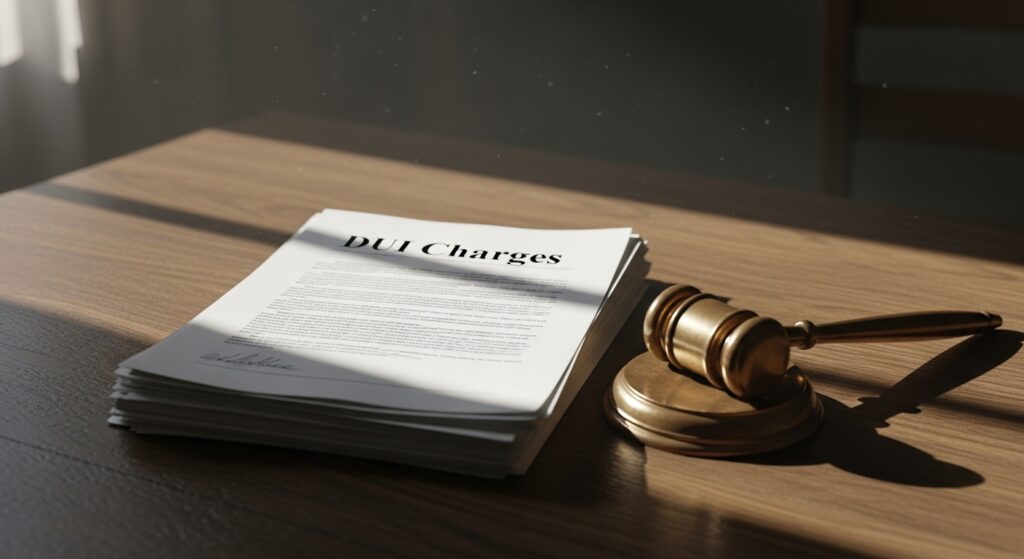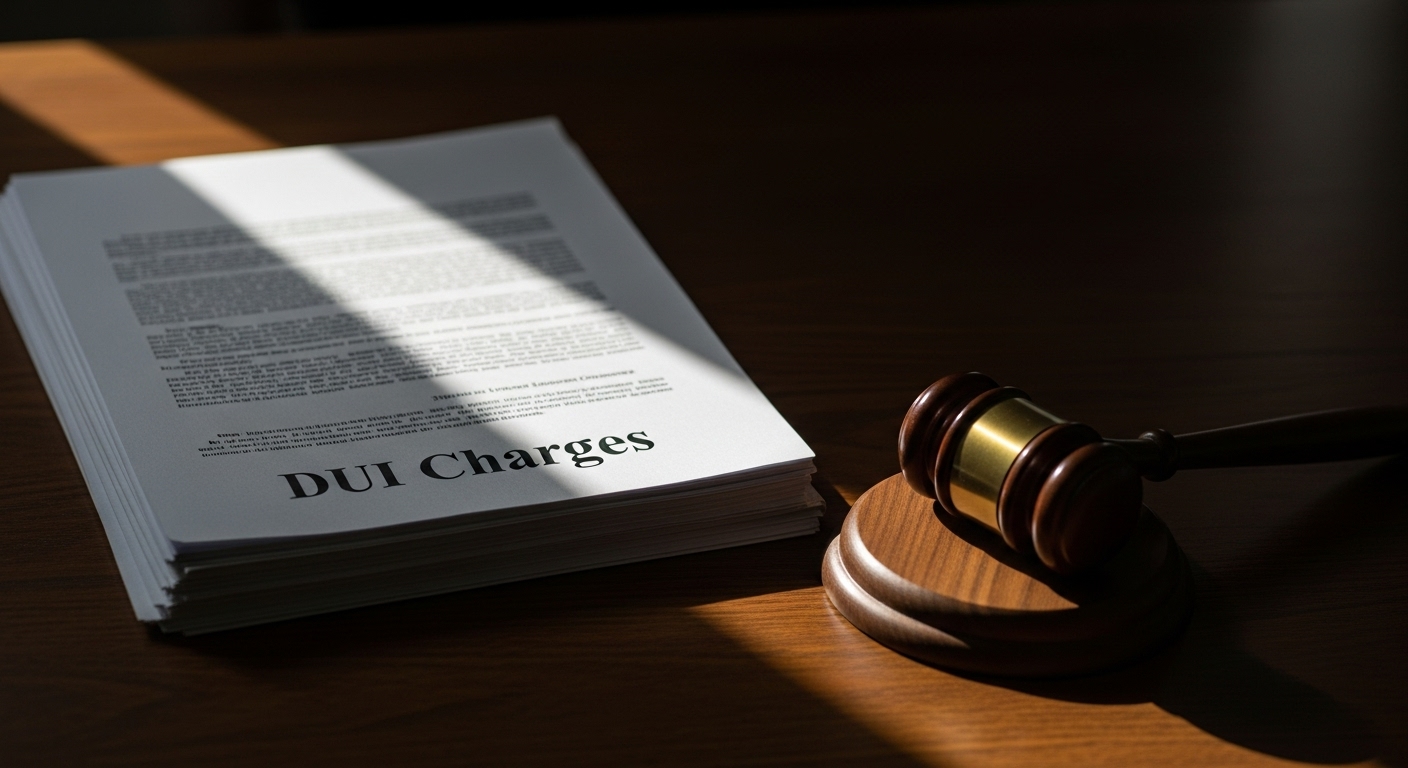
# Your Essential DUI Charges Guide: Navigating Legal Challenges
Facing DUI charges can be an incredibly daunting and stressful experience, filled with fear about severe negative consequences. The thought of financial ruin, loss of freedom, damage to your reputation, and jeopardizing your future prospects is overwhelming. In these critical moments, securing expert legal protection isn’t just an option; it’s an urgent necessity to achieve the best possible outcome. This comprehensive DUI charges guide is designed to empower you with crucial information, from understanding the legal landscape to finding the right DUI attorney near me to protect your rights and future.
Introduction: Understanding DUI Charges and Their Gravity
Driving Under the Influence (DUI) charges are among the most serious traffic offenses, carrying significant legal, financial, and personal repercussions. Whether it’s your first offense or you’re facing repeat charges, the stakes are exceptionally high. Understanding the gravity of these charges and how they can impact every aspect of your life is the first step in building a robust defense. Ignoring or underestimating the potential consequences can lead to devastating long-term effects. This guide will walk you through everything you need to know, emphasizing why immediate and expert legal counsel is paramount.
What is a DUI? Definitions, Legal Limits, and Variations by State
At its core, a DUI involves operating a motor vehicle while impaired by alcohol, drugs, or a combination of both. The legal blood alcohol content (BAC) limit in most U.S. states is 0.08% for drivers 21 and older. However, this can vary:
- Commercial Drivers: Often face stricter limits, typically 0.04% BAC.
- Underage Drivers: Zero-tolerance laws mean even a trace amount of alcohol (e.g., 0.02% BAC) can result in a DUI.
It’s important to note that impairment doesn’t always require exceeding the BAC limit. If an officer determines your driving abilities are compromised due to substances, you could still face charges. State laws also define other critical elements, such as implied consent laws, which stipulate that by driving on public roads, you consent to chemical testing (breath, blood, or urine) if arrested on suspicion of DUI. Refusal often carries its own penalties.
The DUI Arrest Process: From Traffic Stop to Booking
Understanding the typical sequence of a DUI arrest can help you navigate the situation more effectively:
- Traffic Stop: An officer pulls you over for a suspected traffic violation or observed erratic driving.
- Initial Observation & Questioning: The officer will look for signs of impairment (e.g., odor of alcohol, slurred speech, bloodshot eyes) and ask questions about your recent activities.
- Field Sobriety Tests (FSTs): You may be asked to perform FSTs (e.g., walk-and-turn, one-leg stand, horizontal gaze nystagmus) to assess coordination and impairment. These tests are often subjective and challenging even for sober individuals.
- Preliminary Alcohol Screening (PAS): The officer may ask you to blow into a handheld breathalyzer. In many states, this is voluntary, but refusal can have consequences.
- Arrest: If the officer has probable cause based on observations and tests, you will be arrested for DUI.
- Chemical Test at Station: At the police station, you will be asked to undergo a more accurate breath, blood, or urine test. Refusal here typically leads to automatic license suspension under implied consent laws.
- Booking: You will be fingerprinted, photographed, and processed into custody. Eventually, you will be released, often on bail or on your own recognizance, with a court date.
Immediate Actions After a DUI Arrest: Critical Steps to Take
The moments following a DUI arrest are crucial and can significantly impact the outcome of your case. Beyond simply calling a lawyer, here are critical steps to empower you in these moments:
- Remain Silent: You have the right to remain silent. Beyond providing your license, registration, and proof of insurance, do not answer questions about your drinking or drug use without legal counsel. Anything you say can be used against you.
- Do Not Resist: Cooperate physically with the officer’s requests (e.g., getting out of the car, submitting to booking procedures) but assert your right to remain silent verbally.
- Document Everything: As soon as you are able, write down everything you remember about the stop, arrest, and booking process. Details about the officer’s conduct, questions asked, tests administered, and your physical state can be vital for your defense.
- Seek Medical Attention (If Needed): If you sustained any injuries during the arrest or feel unwell, request medical attention immediately.
- Contact a DUI Attorney Immediately: This is perhaps the most critical step. An experienced 24 hour DUI attorney can advise you on next steps, explain your rights, and begin building your defense. Early intervention is key.

Understanding DUI Penalties: Fines, Jail Time, License Suspension Overview
DUI penalties are severe and escalate with prior offenses, often including a combination of:
- Fines: Ranging from hundreds to thousands of dollars, plus court costs and surcharges.
- Jail Time: Even for a first offense, mandatory minimum jail time can be imposed in some states. Subsequent offenses carry significantly longer sentences.
- License Suspension/Revocation: Your driving privileges will almost certainly be suspended, often for several months to several years. You may be eligible for a restricted license (e.g., requiring an Ignition Interlock Device).
- DUI School/Alcohol Education Programs: Mandatory attendance at court-ordered programs.
- Probation: You will be subject to strict conditions, including regular check-ins, abstaining from alcohol/drugs, and potentially random testing.
- Increased Insurance Premiums: Your auto insurance rates will skyrocket, becoming a significant financial burden for years.
Types of DUI Charges: Misdemeanor vs. Felony DUI
Most first and second-offense DUIs are charged as misdemeanors. However, a DUI can quickly become a felony DUI under certain circumstances:
- Prior Convictions: A certain number of previous DUI convictions (e.g., three or four within a specific timeframe).
- Serious Injury or Death: If the DUI causes serious bodily injury or death to another person (vehicular assault or homicide).
- Child Endangerment: Driving under the influence with a minor in the vehicle.
- High BAC: Extremely high blood alcohol content levels.
Felony DUI charges carry far more severe penalties, including lengthy prison sentences, substantial fines, and permanent impacts on your criminal record, making the need for a criminal defense attorney DUI expert even more critical.
Specific DUI Scenarios: Underage DUI, Commercial License DUI, Drug DUI
Underage DUI
For drivers under 21, zero-tolerance laws mean any detectable amount of alcohol can lead to DUI charges, even if below the 0.08% adult limit. Penalties include license suspension, fines, mandatory alcohol education, and a criminal record that can affect college admissions or future employment.
Commercial License DUI
Commercial Driver’s License (CDL) holders face extremely strict DUI laws. A BAC of 0.04% can lead to disqualification of their CDL, severely impacting their livelihood. Even off-duty DUIs can affect their commercial driving privileges. A specialized DUI defense attorney is essential for protecting a CDL.
Drug DUI (DUID)
Driving under the influence of drugs (DUID) is treated just as seriously as alcohol DUI, even if the drug is legally prescribed. The challenge in DUID cases is proving impairment, as there isn’t a simple BAC equivalent. This often involves Drug Recognition Expert (DRE) testimony and blood/urine tests. Defending a DUID requires an attorney familiar with toxicology and medical evidence.
Why You Need a Specialized DUI Attorney: The Stakes Are High
The legal system is complex, especially when facing DUI charges. The consequences are too severe to navigate alone. A specialized DUI attorney brings invaluable expertise:
- Legal Knowledge: They understand state-specific DUI laws, court procedures, and how to challenge evidence.
- Protection of Rights: They ensure your constitutional rights are upheld during the arrest and throughout the legal process.
- Negotiation Skills: Often, an attorney can negotiate with prosecutors for reduced charges or alternative sentencing.
- Defense Strategies: They can identify weaknesses in the prosecution’s case and build a strong defense. For more details on this, see Winning Your DUI Case: Proven Defense Strategies & Legal Challenges.
- Mitigation of Consequences: They work to minimize fines, jail time, license suspension, and other long-term impacts.
Without expert representation, you risk facing the maximum penalties and a long-lasting criminal record.
Finding the Right DUI Attorney Near You: Key Considerations
When searching for a DUI attorney near me, several factors should guide your decision:
- Experience & Specialization: Look for attorneys who specifically focus on DUI/DWI cases, not just general criminal defense.
- Local Knowledge: An attorney familiar with local courts, judges, and prosecutors in your area can provide a significant advantage.
- Track Record: Inquire about their success rates and how they handle cases similar to yours.
- Communication: Choose someone who communicates clearly, explains the legal process, and keeps you informed.
Evaluating Attorney Experience, Specialization, and Track Record
Don’t hesitate to ask prospective attorneys about their specific experience with DUI cases. A good DUI lawyer reviews section on their website or third-party platforms can offer insights into their client satisfaction and results. Ask about their percentage of DUI cases, typical outcomes, and how they approach different types of evidence (e.g., breathalyzer, FSTs, blood tests). A seasoned drunk driving lawyer will have a clear methodology for challenging the prosecution’s evidence and building a strong defense strategy.
The Importance of a Local DUI Lawyer
A DUI lawyer near [your local area] possesses intimate knowledge of the local court rules, the tendencies of specific judges, and the negotiation styles of local prosecutors. This localized expertise can be invaluable in strategizing your defense, predicting outcomes, and navigating the nuances of the regional legal system. Their established relationships and reputation within the local legal community can also play a role.
DUI Attorney Costs, Fees, and Affordability: What to Expect
Understanding dui lawyer cost is a significant concern for many. Fees can vary widely based on several factors:
- Attorney’s Experience & Reputation: Highly experienced and reputable attorneys often charge more.
- Case Complexity: Felony DUIs, cases involving accidents, injuries, or prior offenses will typically cost more due to increased work.
- Geographic Location: Legal fees can differ between urban and rural areas.
- Fee Structure: Most DUI attorneys charge a flat fee for the entire case, while others may work on an hourly basis. Ensure you receive a clear written agreement.
Many firms offer a dui lawyer free consultation, which is an excellent opportunity to discuss your case, understand potential costs, and assess the attorney’s fit. Don’t be afraid to ask about payment plans or DUI attorney with payment plan options. For those with limited financial means, researching ‘DUI legal aid’ or local public defender services might offer options, though specialized DUI expertise can be harder to find through these avenues.

Understanding DUI Defense Strategies: An Overview
An effective DUI defense isn’t about avoiding responsibility but ensuring due process and challenging potentially flawed evidence. Common strategies include:
- Challenging the Traffic Stop: Was there probable cause for the initial stop? If not, all subsequent evidence might be inadmissible.
- Contesting Field Sobriety Tests: These tests are often subjective and prone to error, especially if administered improperly or in adverse conditions.
- Disputing Breathalyzer Results: Calibration issues, improper operation, physiological factors (e.g., GERD, diabetes), or interfering substances can lead to inaccurate readings.
- Questioning Blood Test Procedures: Issues with sample collection, storage, chain of custody, or laboratory analysis can compromise results.
- Miranda Rights Violations: If officers failed to read your Miranda rights at the appropriate time, statements made by you might be suppressed.
- Lack of Impairment: Demonstrating that despite a high BAC, your driving ability was not impaired.
A skilled dui defense attorney will meticulously examine every detail of your arrest to identify the strongest defense angles for your specific case.
Navigating the Court System: Arraignments, Hearings, and Trials
The DUI legal process typically involves several stages:
- Arraignment: This is your first court appearance where you formally hear the charges against you and enter a plea (usually ‘not guilty’).
- Pre-Trial Hearings/Motions: Your attorney will file motions to suppress evidence, challenge procedures, or seek discovery from the prosecution.
- Plea Bargaining: Your attorney will negotiate with the prosecutor to potentially reduce charges or penalties in exchange for a guilty plea.
- Trial: If no plea agreement is reached, your case will proceed to a jury or bench trial where both sides present evidence.
- Sentencing: If convicted, the judge will impose penalties based on the law and circumstances of your case.
Throughout this complex process, having an expert legal advocate by your side is indispensable.
Beyond the Legal Battle: Long-Term Consequences of a DUI Overview
While legal penalties are severe, a DUI conviction’s impact extends far beyond the courtroom and initial fines. The long-term consequences can profoundly affect your life:
- Criminal Record: A DUI conviction creates a permanent criminal record, which is publicly accessible. This can complicate background checks for employment, housing, and professional licenses.
- Employment Impact: Many employers view DUI convictions negatively. It can hinder job opportunities, lead to termination, or restrict certain career paths, especially those involving driving or professional licensing.
- Financial Strain: Beyond fines and court costs, anticipate significantly higher auto insurance premiums for years, mandatory installation and maintenance fees for Ignition Interlock Devices, and potential costs for substance abuse evaluations and treatment programs.
- Travel Restrictions: Some countries may deny entry to individuals with a DUI conviction on their record.
- Social Stigma: A DUI can carry a social stigma, affecting personal relationships and reputation within the community.
- Loss of Educational Opportunities: Some colleges or universities may revoke admissions or scholarships, and certain professional licenses (e.g., medical, legal, teaching) can be jeopardized. For a deeper dive into these impacts, refer to Beyond the Courtroom: The Devastating Long-Term Consequences of a DUI Conviction.
Conclusion: Empowering Your Defense and Protecting Your Future
Navigating DUI charges is a challenging journey, but you don’t have to face it alone. This DUI charges guide has provided a roadmap to understanding the legal landscape, the immediate actions required, the severe penalties involved, and the critical importance of specialized legal representation. The core user pain point—the overwhelming fear of negative consequences—can be directly addressed by entrusting your case to an experienced DUI attorney near me. Their expertise is your strongest asset in protecting your freedom, financial stability, and future prospects.
Don’t wait. If you or a loved one is facing DUI charges, take immediate action. Contact an experienced DUI defense attorney today for a free consultation to discuss your options and begin building your defense. Your future depends on it.
